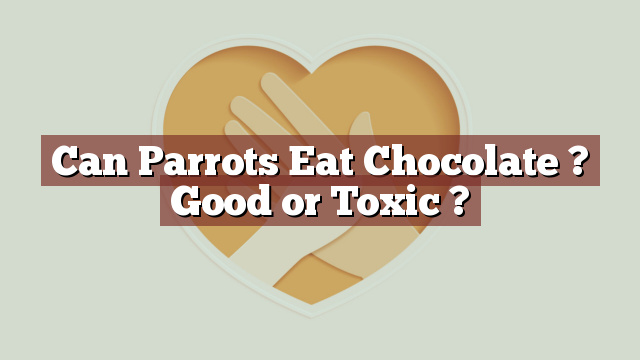Can Parrots Eat Chocolate? Good or Toxic?
It is important for parrot owners to be aware of what foods are safe for their feathered friends to consume. One commonly asked question is whether parrots can eat chocolate. In this article, we will delve into the nutritional value of chocolate for parrots, explore whether it is safe or toxic for them, discuss potential risks and benefits, and provide guidance on what to do if your parrot accidentally consumes chocolate.
Nutritional Value of Chocolate for Parrots
Chocolate is a popular treat enjoyed by humans worldwide. It is made from the seeds of the Theobroma cacao tree and comes in various forms such as dark chocolate, milk chocolate, and white chocolate. However, chocolate does not offer any significant nutritional benefits to parrots. It is primarily composed of sugar, fat, and cocoa, which do not meet the dietary needs of these birds.
Can Parrots Eat Chocolate? Is it Safe or Toxic?
No, parrots should not consume chocolate. Chocolate contains a substance called theobromine, which is toxic to birds. Theobromine affects the central nervous system and cardiovascular system of parrots, leading to various health issues. Parrots lack the enzyme required to metabolize theobromine, making it highly dangerous for them.
Scientific research and veterinary insights strongly advise against feeding chocolate to parrots. Even a small amount of chocolate can cause severe illness or, in some cases, be fatal to these beloved pets.
Potential Risks and Benefits of Chocolate for Parrots
The potential risks of feeding chocolate to parrots far outweigh any perceived benefits. The theobromine in chocolate can lead to symptoms such as vomiting, diarrhea, increased heart rate, hyperactivity, and even seizures in parrots. If left untreated, chocolate poisoning can be life-threatening to these birds.
On the other hand, there are no inherent benefits of chocolate specifically for parrots. Their dietary requirements are best met with a well-balanced diet consisting of fruits, vegetables, pellets, and seeds that are appropriate for their species.
What to Do if Your Parrot Eats Chocolate?
If you suspect that your parrot has consumed chocolate, it is crucial to take immediate action. Contact your avian veterinarian or an emergency animal clinic for guidance. Time is of the essence when dealing with potential chocolate toxicity in parrots. The veterinarian may advise inducing vomiting or administering activated charcoal to help eliminate the toxins from your parrot’s system.
While waiting for professional help, observe your parrot closely for any signs of distress or illness. Provide fresh water and remove any remaining chocolate from their environment to prevent further consumption.
Conclusion: Chocolate is Toxic for Parrots
In conclusion, chocolate is toxic for parrots. The theobromine content in chocolate makes it unsafe and potentially life-threatening for these birds. Parrots should not be given chocolate under any circumstances.
As responsible parrot owners, it is crucial to be knowledgeable about safe foods and treats for our feathered companions. A balanced and appropriate diet, along with regular veterinary care, will help ensure the well-being and longevity of our beloved parrots.
Thank you for investing your time in exploring [page_title] on Can-Eat.org. Our goal is to provide readers like you with thorough and reliable information about various dietary topics. Each article, including [page_title], stems from diligent research and a passion for understanding the nuances of our food choices. We believe that knowledge is a vital step towards making informed and healthy decisions. However, while "[page_title]" sheds light on its specific topic, it's crucial to remember that everyone's body reacts differently to foods and dietary changes. What might be beneficial for one person could have different effects on another. Before you consider integrating suggestions or insights from "[page_title]" into your diet, it's always wise to consult with a nutritionist or healthcare professional. Their specialized knowledge ensures that you're making choices best suited to your individual health needs. As you navigate [page_title], be mindful of potential allergies, intolerances, or unique dietary requirements you may have. No singular article can capture the vast diversity of human health, and individualized guidance is invaluable. The content provided in [page_title] serves as a general guide. It is not, by any means, a substitute for personalized medical or nutritional advice. Your health should always be the top priority, and professional guidance is the best path forward. In your journey towards a balanced and nutritious lifestyle, we hope that [page_title] serves as a helpful stepping stone. Remember, informed decisions lead to healthier outcomes. Thank you for trusting Can-Eat.org. Continue exploring, learning, and prioritizing your health. Cheers to a well-informed and healthier future!

